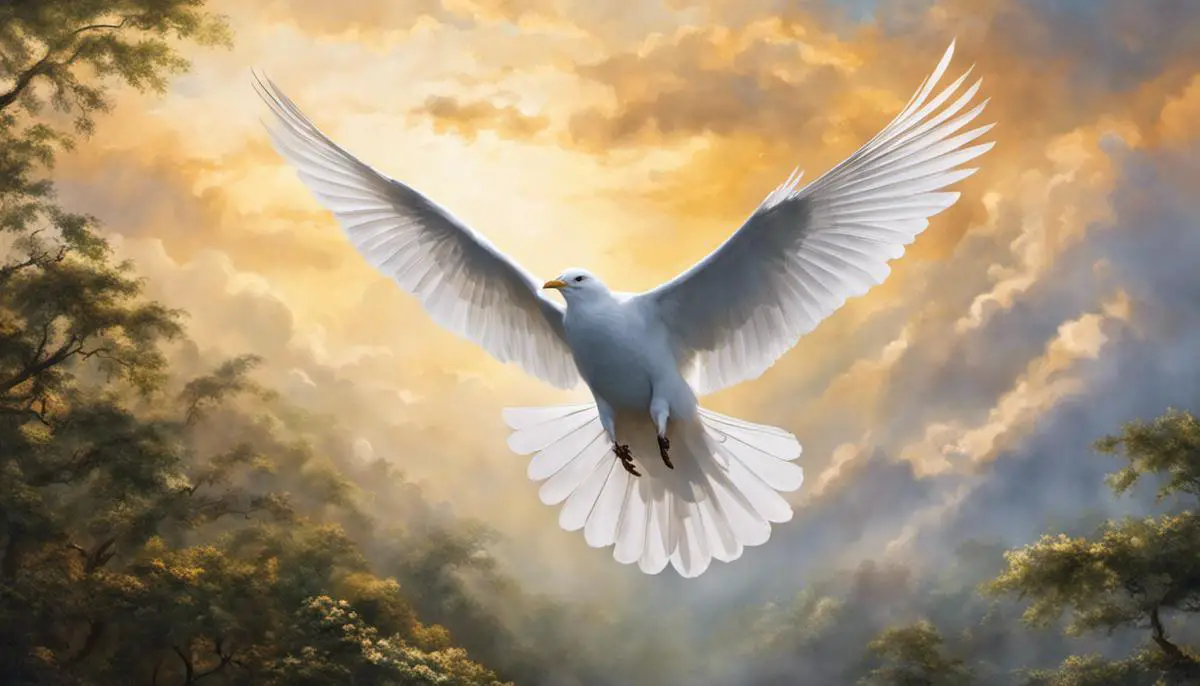The world of dreams is a mysterious and intriguing realm where our subconscious mind takes the lead, painting narratives that often hold deep, symbolic meanings. One such symbol, particularly intriguing due to its cross-cultural significance, is the vision of a white bird. Across myriad cultures, from the indigenous tribes of the Americas to the ancient Greek and Roman civilizations to eastern Asian societies, the image of the white bird holds a profound symbolism, often associated with notions of purity, peace, and, in some interpretations, luck. Additionally, within the realm of dream psychology, luminaries such as Freud and Jung have their own interpretations over what these winged apparitions may symbolize. The dreams of white birds have also permeated the personal narratives of many individuals, often viewed as precursors to strokes of luck. Despite these fascinating anecdotes, it’s significant to critically analyze the perceived link between white bird dreams and the concept of good luck, bearing in mind the phenomena of confirmation bias and placebo effect.
Symbolism of White Birds in Various Cultures
Symbolism of White Birds in Various Cultures
White birds are seen universally as symbols of purity, peace, and tranquility. In many cultures, white birds are associated with divine messages or spiritual encounters. They often represent honesty, purity, peace, and innocent.
In Native American cultures, white birds, especially doves and eagles, have deep spiritual significance. The dove is seen as a messenger of peace and love, while the eagle symbolizes spiritual protection, carrier of prayers, and strength. To dream of these birds means guidance, protection or divine intervention.
In ancient Greek and Roman cultures, the white bird, particularly the dove, holds a holy connotation. In ancient Roman myth, white doves are dedicated to Venus, the goddess of love. They believed that dreaming of white birds brings love and affection in one’s life. It was often considered to be an auspicious sign indicating love, peace, and prosperity.
Similarly, in Christianity, the dove symbolizes the Holy Spirit. It’s widely viewed as a sign of divine love, spiritual grace and mercy. Therefore, seeing white birds in dreams may be interpreted as receiving divine love or guidance from the Holy Spirit.
Asian cultures also attach significance to white birds. In Chinese culture, the white crane, for instance, is often associated with longevity and wisdom. To dream of a white crane might signify long life, wisdom, or good fortune.
Thus, considering various cultural beliefs, dreaming of white birds can often be seen as a symbol of good luck. However, the interpretation of such dreams can vary based on the specific bird species or the context in which the bird appears in the dream.
Interpreting White Birds in Dreams
Dreams that feature white birds typically symbolize aspects such as peace, prosperity, freedom, and purity. They could also indicate spiritual awakening or convey divine messages, depending on the context of the dream. Interpreted as symbols of good luck or promising changes, these dreams are often experienced in times of personal growth or during transformative phases in life, hinting at a peaceful or fortunate future.
Summarily, the representation of white birds across various cultures, coupled with their interpretation in dreams, strongly favors the notion that dreams of white birds indicate good luck, divine guidance, or positive changes. For comprehensive and accurate interpretation, however, it is vital to consider other dream elements and their context.

Interpreting White Bird Dreams in Dream Psychology
The Symbolism of Birds and the Color White in Dream Psychology
Dream psychologists commonly interpret birds in dreams as symbols of spiritual freedom and transcendent communication. Viewed as messengers from the spiritual or unconscious realm, birds are thought to represent ideas, thoughts, or hopes soaring to celestial heights. Meanwhile, the color white is typically linked with purity, peace, and innocence. A white bird, therefore, can combine these interpretations to signify purity of ideas, thoughts or hopes, and spiritual transcendence unaffected by worldly influence.
Jungian Interpretation of White Bird Dreams
Carl Jung, a Swiss psychiatrist and founder of analytical psychology, believed that dreams are a way of communicating with the unconscious mind. He introduced the idea of archetypal symbols in dreams, which are universally recognizable images or figures carrying specific meanings. From a Jungian perspective, a white bird might symbolize an archetypal symbol of the ‘Self,’ representing freedom, transcendence, and spiritual awakening. Seeing a white bird in your dream might be a message from your unconscious, a call to transcend your limitations and reach towards higher spiritual awareness. It could also represent transformation, especially if the bird is seen flying upwards.
Freudian Interpretation of White Bird Dreams
Sigmund Freud, the father of psychoanalysis, viewed dreams as the “royal road to the unconscious.” Freud’s approach to dream interpretation often centered on sexual symbolism and repressed desires. In Freud’s view, birds may symbolize freedom and escape from earthly bonds, often due to pent up sexual energy. The color white might stand for innocence and purity in a Freudian interpretation. A white bird, therefore, could represent a desire for innocent or pure sexual expression or a release of repressed sexual energy.
Understanding White Bird Dreams as Symbols of Good Luck
In the realm of dream interpretation, results can be highly subjective and largely depend on personal experiences and cultural norms. One commonly accepted symbol across various cultures is that of a white bird—be it a dove, swan, or other species. These creatures are often viewed as representing love, tranquility, and good luck. Therefore, dreaming of such a bird could signify forthcoming positivity, or a turn in fortune. If the white bird in your dream is soaring or flying, it may suggest you are set to overcome obstacles and rise above negative circumstances.
Nevertheless, the surrounding details and context of the dream are equally important in discerning its true meaning. The specific events and emotions tied to the dream, along with the concurrent happenings in your life, could greatly influence its interpretation.
On the whole, dreams featuring white birds are generally construed as positive omens, indicating impending peace, freedom, or good luck. Yet, it’s crucial to remember that like all dreams, the final interpretation is contingent upon individual perspectives and real-life scenarios.

Anecdotes and Personal Experiences
Personal Experiences Associated with White Bird Dreams
Reports from those who have dreamed of white birds often coincide with a streak of good luck or positive changes following their dreams. While these experiences differ, they typically carry undertones of luck or auspicious outcomes.
Consider, for instance, the case of a struggling entrepreneur who dreamed of a flock of white birds overhead. The very next day, he secured a substantial business deal that not only saved his company from bankruptcy but catapulted it into a phase of significant growth. His dream of white birds thus carried the premonition of an imminent upturn in his luck.
Traditions and Folklore: White Bird Dreams as a Sign of Good Luck
Belief in white bird dreams as a sign of good luck isn’t just based on individual accounts. Many cultures across the world, from East to West, associate white birds with good luck, cleansed energy and peace. In Native American Cherokee tradition, seeing a white bird or bird feather in dreams is considered a positive omen signifying future prosperity and peace.
Similarly, there exist a multitude of anecdotes in Celtic mythology, where white birds, specifically white swans, in dreams are viewed as prophetic messages indicating forthcoming prosperity, or symbolic transitions into better phases of life.
Dreams of White Birds: Echoes in Psychoanalysis
The interpretation of white bird dreams isn’t confined to folklore or personal anecdotes. In psychoanalytic circles, dreaming of white birds is considered a positive sign. Carl Jung, a prominent psychoanalyst, viewed birds in dreams as symbols of freedom, transcendence, and the human soul. White, in psychological terms, is associated with purity, peace, and positivity. Thus, a white bird appearing in dreams can represent the act of freeing oneself from psychological constraints, which can in turn lead to positive outcomes and increased good luck in waking life.
Crossing Cultural Divides
From the Native American tribes to the ancient Celts and through to contemporary psychoanalysis, the symbolism of dreaming about white birds appears to be a universal sign of impending positivity and strokes of good luck. This phenomenon of individuals across varied backgrounds reporting streaks of fortune after experiencing dreams involving white birds might be subjective to personal interpretations, yet it undeniably bears a profound impact on impressions and life experiences.

Examining the Link between Luck and White Bird Dreams
Deciphering the Language of Dreams
The symbolism attached to dreams often fluctuates across diverse cultures and philosophies. One prevailing theory about dreams suggests that these nocturnal narratives serve as conduits, relaying signals from our subconscious minds and thereby revealing latent emotions and thoughts.
The Scientific Take on Dream Interpretation
Most psychologists and neuroscientists don’t link dreams strictly with future events or luck. They believe dreams are more associated with memory consolidation, problem-solving, and emotional processing.
Carl Jung, a prolific Swiss psychiatrist and psychoanalyst, suggested dreams present the dreamer with issues that are seeking resolution. The concept of “white bird” dreams in this context could symbolize personal or spiritual transformation and invite the dreamer to address these life aspects.
White Bird Dreams and Luck
From a purely superstition-based perspective, dreams of white birds might be seen as a sign of good fortune to come. This belief primarily comes from folklore and isn’t scientifically supported. Some cultures might interpret seeing a white bird in a dream as receiving divine blessings, symbolizing positive changes or growth.
The Power of Belief and Confirmation Bias
Whether white bird dreams genuinely bring good luck might heavily depend on the power of belief and confirmation bias. People who believe strongly in the symbolism and predictive power of dreams are more likely to perceive a correlation between their dreams and subsequent life events.
Confirmation bias comes into play when a person starts actively searching for and identifying instances of good luck after having a white bird dream. It’s a psychological phenomenon where people tend to notice and remember events that confirm their existing beliefs while ignoring those that disprove or contradict them.
Regardless of whether white bird dreams ‘truly’ signal good luck, the comfort and positivity they bring can have a positive impact on the dreamer’s psychological state and outlook on life. This positivity can also influence one’s actions, decisions, and interactions, inadvertently creating conditions for “good luck” to occur.

Through an exploration of cultural symbolisms, psychological interpretations, personal anecdotes and a critical examination of the purported link with luck, we’ve gleaned a multi-dimensional understanding of white bird dreams. They embody much more than mere nightly musings, reaching into the depths of cultural traditions, personal significance and psychological schematics. The white bird’s image in our dreams is a conduit of multiple perspectives and interpretations, each as intriguing as the other. But, perhaps most captivating is the symbiotic relationship we humans have with these figures of our subconscious. Whether or not they herald moments of good fortune, these avian apparitions, in their ethereal beauty and tranquil serenity, alone make for an enriching dream tapestry, reflecting the fascinating complexities of our mind’s faculties.
